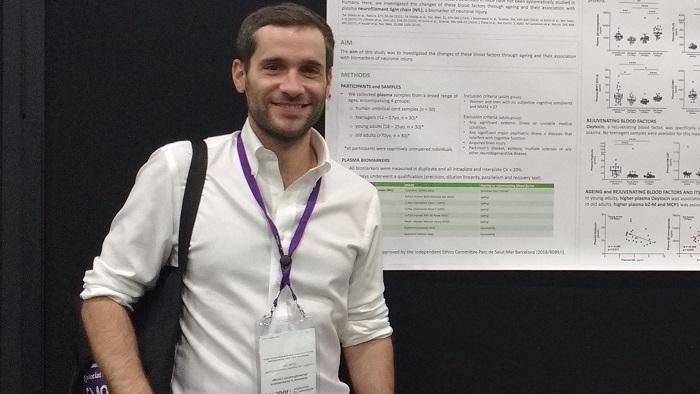30 Aug | 2019
Scientists identify a protein that could protect against Alzheimer’s disease

Marc Suárez-Calvet, researcher at the Barcelonaβeta Brain Research Center
High levels of TREM2 protein, which is involved in the immune response in the brain, predict a better prognosis in patients with Alzheimer’s disease. This is described by an international study led by Christian Haass at University of Munich in which Marc Suárez-Calvet, a researcher at the Barcelonaβeta Brain Research Center (BBRC), the center of the Pasqual Maragall Foundation, participated as a coauthor.
The study, published in Science Traslational Medicine, is the first longitudinal study in humans after numerous results with animals. “We prove that increasing TREM2 function is a valuable therapeutic target to slow the progression of Alzheimer’s disease”, highlights Dr. Suárez-Calvet.
A marker of slower evolution of Alzheimer’s disease
Soluble TREM2 (sTREM2) has been analyzed in cerebrospinal fluid. This protein is found in microglia, the immune response cells in the brain, which are responsible of the removal of harmful proteins in the brain (such as b-amiloide, a protein that accumulates in the brain of patients with Alzheimer’s disease) and the remains of neurons that die because of the disease.
For about 4 years, patients were followed up. sTREM2 levels in cerebrospinal fluid were compared with their results in cognitive tests and neuroimaging tests. This way, they found that patients with higher baseline levels of sTREM2 had lower cognitive impairment and less atrophy in areas of the brain involved in memory, such as the hippocampus.
The study confirms that TREM2 is an important therapeutic target for the disease. “The activation of this protein with drugs can be studied in future clinical trials. Perhaps it won’t be useful to cure the disease, but it will help to slow its evolution, as in other chronic diseases”, explains Dr. Suárez-Calvet.
The research has been led by the University of Munich (Ludwig-Maximilians Universität) and the Center for Neurodegenerative Diseases of Germany (DZNE), in collaboration with the University of Washington, the University of Pennsylvania and the University of California.
The investigation continues in the BBRC
Marc Suárez-Calvet, one of the first authors of the study, is a member of the Clinical, Biomarker and Risk Factors Research Group at the BBRC, where he lead research on new blood biomarkers for neurodegenerative diseases.
His work in Munich continues from the BBRC, where he analyzes TREM2 protein in participants of the Alfa Study, promoted by “la Caixa”. The goal is to discover whether the role of this protein is also important for the development of Alzheimer’s disease in even earlier phases, when symptoms are not present yet.










